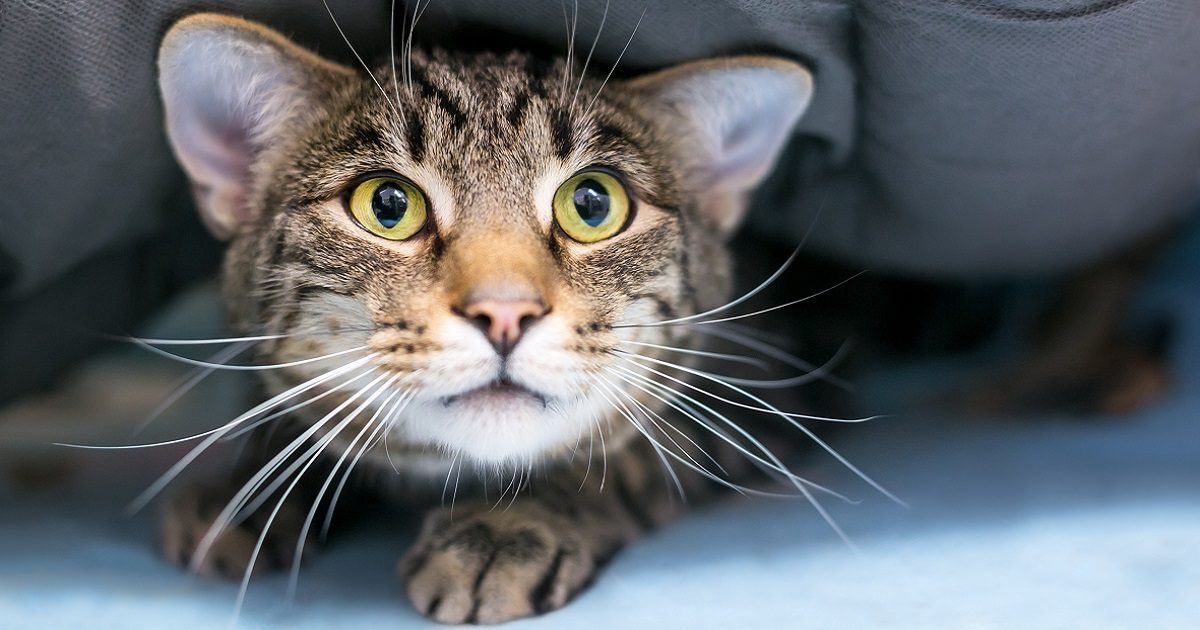How to support your anxious pets
We asked two animal behaviour experts for advice on how to help our furry friends avoid anxiety.
It’s not just humans who get nervous and upset or anxious. This can be the case for animals too, including dogs, cats… all animals. So how you can you support your anxious pets?
Just like us, animals’ needs can really vary, when we all live under the same roof. A young puppy might revel in the fact that they have a whole family of people to play with all day long. But an elderly dog or cat could be desperate for some alone time.
Have an older dog with arthrits? You might like this feature
Have a routine, and stick to it
So how can we help our pets feel secure? Emily Birch of Canine Consultancy says it’s all about sticking to the dog’s normal routine as much as you can, particularly if there are children in the house.
‘Ensure that anxious dogs still have some “downtime” each day,’ she says, ‘so they don’t become over-tired. If they are used to a morning walk, a lunchtime walk or toilet break and then some fun and games in the evening, try to keep to that routine.’
Birch says you can set dogs up for success by giving them a space that is theirs, such as a puppy pen, covered crate, or a room away from the hustle and bustle of daily life.
‘Teach them that this is a place to relax and switch off. Begin by ensuring their physical exercise needs have been met and that they’re ready to sleep. Then give them a stuffed food toy such as a Kong. Licking and chewing is calming behaviour for dogs and will help them to relax and switch off.’
Change in routine is going to confuse them
While most pets will typically be used to having their owners at home more in the evenings and at weekends, change in routines affect pets. And if you’re working at home, this can be an issue.
‘Some dogs will be used to their owners’ undivided attention when they are home in the evenings and at weekends,’ says pet behaviour consultant Rosie Bescoby from pet-sense.co.uk. ‘So [during lockdown] they could be frustrated that their owners’ attention isn’t available to them when they want or expect it. This can lead to undesirable behaviours in their attempts to gain their owners’ attention.’
She explains how a change in routine can be unsettling for both cats and dogs. ‘Cats in particular are very sensitive to change. They like to feel in control of their environment so change in routine can induce stress. Dogs (and cats) need a huge amount of sleep in the day and, like us, they are less able to cope if they are sleep-deprived.’

She recognises that having children at home all day won’t necessarily help when it comes to keeping pets in their regular routine. ‘Kids can be noisy and erratic in their movements, being grabby towards animals and disturbing them when they sleep,’ she warns.
How to reduce unwanted behaviour
‘Dogs are social species and as a result, they generally enjoy company. As a behaviourist I often see issues when dogs are left for long periods of time and when their biological and social needs are not fully met,’ says Birch.
‘Some dogs “cope” with this ok and you won’t see any outward signs. But others will demonstrate this more clearly by destroying the house, being hyperactive when owners are home, and vocalising.
‘That said, one risk factor that hasn’t been massively explored is that of bite risks to children. We know from the evidence that biting incidents increase during the school holidays, due to dogs’ increased exposure to children.’
So it’s important that you teach children about pets, their boundaries, and how to respect them. This will avoid upsetting the pet, and save on dog bites.
Don’t be cross with them
 Frustrating as any unwanted behaviour will be, one thing owners shouldn’t do is tell their pets off, says Bescoby. It’s all about carrot, not stick.
Frustrating as any unwanted behaviour will be, one thing owners shouldn’t do is tell their pets off, says Bescoby. It’s all about carrot, not stick.
‘Getting annoyed or frustrated with them will just increase stress, as you’re not providing them with any information about what you DO want them to do.’
The other thing that is fundamental to looking after pets is understanding subtle signs that say your dog isn’t ok. ‘Look for things such as turning away, licking their lips, yawning, shaking as if they’re wet, and lifting a paw,’ says Birch. ‘These are all signs that say they’re not very comfortable right now and need some space. If you listen to these subtle signs (the whispers) they don’t need to shout (growl or snap).’
How to help them be home alone
If you’re working, your pets may find they’re being left alone in the house for long periods of time. This is less than ideal, and should be avoided. It can potentially lead to confusion and stress. But if they do have to be left, how can we make that easier on them?
‘Set them up to succeed by easing them into it,’ says Birch. ‘Leave them with a frozen Kong – you can freeze their normal meal into it (if you feed dry kibble just soak it first) so you don’t have to worry about weight gain.
‘Initially leave them for five minutes and then increase this time up until they’re happy with you leaving. If you still have problems it is worth contacting a qualified behaviourist to help you take smaller steps.’
Concentrate on the positives
Birch reiterates the idea of focusing on what you DO want to happen rather than what you DON’T want. ‘For example, “I don’t want my dog to get distressed when I leave” is hard to train. Whereas “I want my dog to be relaxed and sleep while I am out” is something you can teach them to do. This empowers you to change your dog’s behaviour.’
Bescoby agrees. ‘Many dogs may struggle with owners leaving the house without them and may show signs of vocalising, destruction, or other symptoms of distress when left alone.
‘This behaviour is unlikely to self-resolve. In this case I would recommend seeking advice from a member of the Association of Pet Behaviour Counsellors.’
Find Emily Birch at Canine Consultancy
And Rosie Bescoby at pet-sense.co.uk
Find a good pet counsellor at the Association of Pet Behaviour Counsellors



Leave a comment